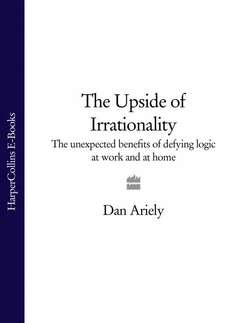Читать книгу The Upside of Irrationality: The Unexpected Benefits of Defying Logic at Work and at Home - Дэн Ариели, Dan Ariely, Dan Ariely - Страница 18
CARING AS A DOUBLE-EDGED SWORD
ОглавлениеFirst Knight, a movie that came out in 1995 starring Sean Connery and Richard Gere, demonstrates one extreme way of dealing with the way motivation affects performance. Richard Gere’s character, Sir Lancelot, is a vagabond expert swordsman who duels to pay the bills. Toward the beginning of the film, he sets up a kind of mini sparring clinic where the villagers pay to test their skills against him while he dispenses witty advice for their improvement. At one point, Lancelot suggests that someone out there must be better than he, and wouldn’t that person love to win the gold pieces he happens to have clinking around in a bag?
Finally, an enormous blond man named Mark challenges him. They fight furiously for a brief time. Then, of course, Lancelot disarms Mark. The latter, confused, asks Lancelot how he managed to disarm him and whether it was a trick. Lancelot smilingly says that that’s just how he fights, no trick to it. (Well, there is one mental trick, as we discover later.) When Mark asks Lancelot to teach him, Lancelot pauses for a moment before giving his lesson. He offers Mark three tips: first, to observe the man he’s fighting and learn how he moves and thinks; second, to await the make-or-break moment in the match and go for it then. Up to that point, Mark smiles and nods happily, sure he can learn to do those things. Lancelot’s final tip, however, is a little more difficult to follow. He tells his eager student that he can’t care about living or dying. Mark stares into his face, astonished; Lancelot smiles sadly and walks off into the sunset like a medieval cowboy.
Judging from this advice, it seems that Lancelot fights better than anyone else because he has found a way to bring the stress of the situation to zero. If he doesn’t care whether he lives or dies, nothing rides on his performance. He doesn’t worry about living past the end of the fight, so nothing clouds his mind and affects his abilities—he is pure concentration and skill.
Seen from this perspective, the findings presented in this chapter suggest that our tendency to behave irrationally and in ways that are undesirable might increase when the decisions are more important. In our India experiment, the participants behaved very much as standard economics would predict when the incentives were relatively low. But they did not behave as standard economics would predict when it really mattered and the incentives were highest.
COULD ALL THIS mean that sometimes we might actually behave less rationally when we try harder? If that’s so, what is the correct way to pay people without overstressing them? One simple solution is to keep bonuses low—something those bankers I met with might not appreciate. Another approach might be to pay employees on a straight salary basis. Though it would eliminate the consequences of overmotivation, it would also eradicate some of the benefits of performance-based payment. A better approach might be to keep the motivating element of performance-based payment but eliminate some of the nonproductive stress it creates. To achieve this, we could, for example, offer employees smaller and more frequent bonuses. Another approach might be to offer employees a performance-based payment that is averaged over time—say, the previous five years, rather than only the last year. This way, employees in their fifth year would know 80 percent of their bonus in advance (based on the previous four years), and the immediate effect of the present year’s performance would matter less.
Whatever approach we take to optimize performance, it should be clear that we need a better understanding of the links between compensation, motivation, stress, and performance. And we need to take our peculiarities and irrationalities into account.
P.S. I WOULD like to dedicate this chapter to my banker friends, who repeatedly “enjoy” hearing my opinion about their salaries and are nevertheless still willing to talk to me.
